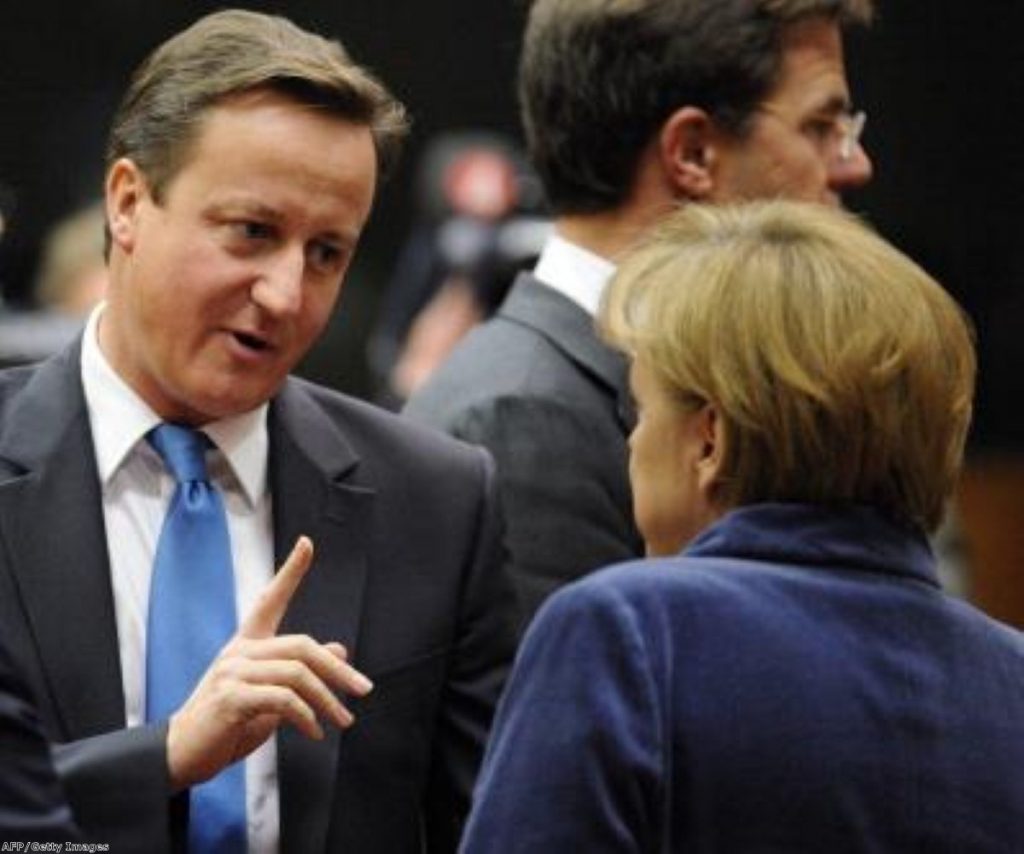Cameron and Merkel in eurozone standoff
By Alex Stevenson Follow @alex__stevenson
By Alex Stevenson
Britain and Germany's positions on how to deal with the eurozone crisis seem even further apart after talks between the two country's leaders in Berlin.
Neither David Cameron nor Angela Merkel gave any ground as they met for fraught talks confronting their differing approaches to the eurozone crisis.


Ms Merkel confirmed the British government's fears about possible accelerated political integration of the 17 eurozone countries when she told journalists in their joint press conference that she wanted to see "limited treaty change".
Mr Cameron made clear he disagreed fundamentally with the German chancellor's approach.
"It's obvious we don't agree on every aspect of European policy," he said, before expressing hope that both sides could overcome their differences.
Both leaders sought to downplay the extent of the divide which now separates London and Berlin's approaches to the eurozone crisis. Ms Merkel said: "I don't think we should be led astray by these little hiccups."
But it was clear Britain's enthusiasm for the European Central Bank to become a lender of last resort was stridently opposed by Germany.
Mr Cameron said: "All the institutions of the eurozone have to stand behind and back the currency and do everything necessary to defend it."
Ms Merkel underlined the "differences of opinion" on the issue as she rejected the UK's attitude.
"I believe credibility is regained by using the force and the strength that you have," she said.
"The British say we have to do our utmost and use all our force available. I think that's right, but one should not pretend to be more powerful than one is because the markets will know and find this out."
Britain is concerned that rapid surrenders of sovereignty to Brussels by eurozone states in a bid to save the currency from its ongoing debt crisis could lead to a two-tier EU, where the ten non-euro EU member states struggle to gain the same access to the single market.
Ms Merkel's Christian Democratic Union (CDU) party is calling for talks to this end to begin immediately. Germany wants EU countries to adopt a more cautious approach to fiscal policy, prompting claims from some quarters that the country is once again seeking to establish itself as the continent's leader.
The UK is especially concerned about plans to establish the Tobin tax on bankers' transactions. Britain fears it would be hit disproportionately, driving traders away from the City of London.
Ms Merkel admitted that there had been no progress on the issue.
"The danger we've always believed is driving transactions to jurisdictions where it wouldn't be applied," the prime minister said.
Relations between Germany and London are especially frosty at the moment, with both sides expressing hostility in domestic politics.
Mr Cameron endured a massive revolt against his refusal to allow a referendum on Britain's membership of the EU last month, while in Germany the CDU's parliamentary leader has been riling eurosceptics by insisting Britain will not be able to "get away" from efforts to stabilise the eurozone.
"Now all of a sudden, Europe is speaking German," Mr Kauder said.
"Not as a language, but in its acceptance of the instruments for which Angela Merkel has fought so hard, and with success in the end."
Earlier the prime minister met with European Commission president Jose Manuel Barroso and European Council president Herman Van Rompuy for breakfast talks, before travelling to Berlin this lunchtime.
Mr Cameron and Mr Barroso agreed on the importance of prioritising decisive action to stabilise the euro area and fast-track measures to stimulate growth and jobs.
"They both underlined the central importance of further developing the single market to deliver its full growth potential in the interests of businesses and citizens across the Union and especially to help small and medium sized enterprises," a Downing Street spokesman said.

